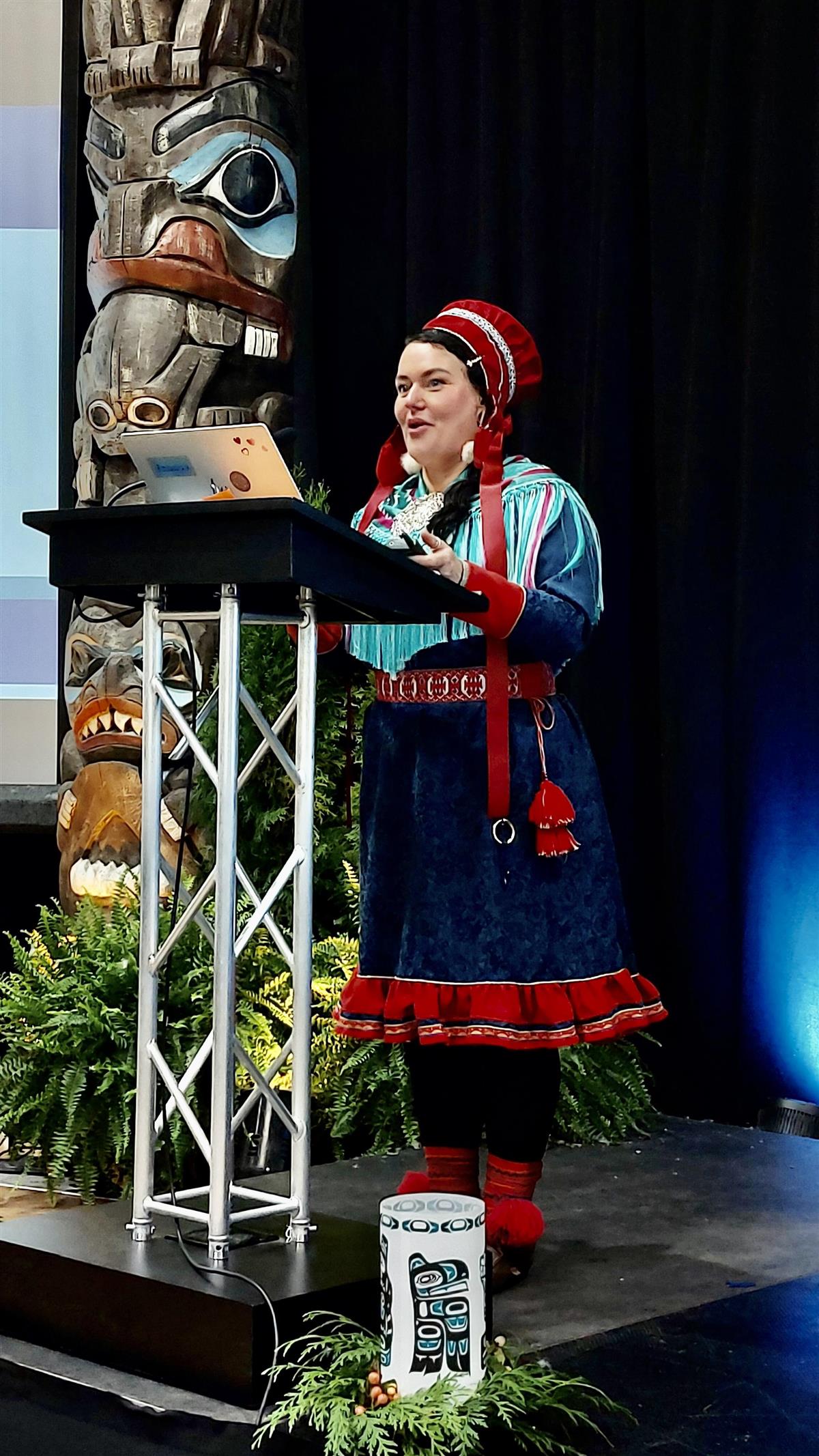 Sametingspresident Silje Karine Muotka er nå i Vancouver, Canada
Vegar Jakobsen Bæhr
Sametingspresident Silje Karine Muotka er nå i Vancouver, Canada
Vegar Jakobsen Bæhr
Buorit olbmot, luossaberošteaddjit!
Dear dignitaries, experts and participants -those who are valuing our precious salmon high.
First, I would like to express greeting in my own language (speaking Sámi)
Ollu giitu to all of you for sharing knowledge during these days here in Vancouver. Thank you for the knowledge that we are sharing here during these days.
We gratefully acknowledge the Native Peoples on whose ancestral homelands we gather - on the area that belongs to the Musqueam nation, the Squamish nation and the Tsleil-Waututh nation.
It warms my heart to listen when elder Larry Grant from Musqueam Nations did bless us with a prayer and giving us such a warm welcome to your land. I know the coast Salish Peoples are diverse and that their knowledge and spirits are remarkable, I am grateful for all the teachings I did receive when I was here a period for over 25 years ago as a student.
I also want to share that we, the Sámi i people, are devastated by all missing and murdered indigenous women and the genocide of indigenous children at residential schools. My thoughts are with you all who has suffered, carrying a pain and tears from residential schools, including the survivors. All the indigenous parents, siblings, extended families and the indigenous world that is crying with and for you.
I am bringing greetings to all of you from Sámediggi- The Sámi Parliament in Norway.
The Sámi delegation has travelled far, across the Atlantic ocean and Canada to meet other Indigenous brothers and sisters. To be here and share our views, traditions and knowledge from and for the salmon. During these three days we have experienced that our situation unfortunately is very similar - echoed by other indigenous salmon peoples.
The dramatic decline in salmon fishing has brought us in a situation that we are not able to fish as we used to it and this is affecting our livelihood. In our area the salmon rivers are the best rivers in Europe and has given us the life, from generation to generation. Even though we have had a strict and also an increasing governmental regulations from two states, Finland and Norway, the situation is getting worse. We are not able to fish any longer in some of our rivers and this has an negative impact and challenging the river Sámis and this has brought a challenging public debate where everybody points towards other as the biggest threat to the salmon.
I know you all do know much about the salmon. I know you will share your knowledge the forthcoming days. I ask for respectful discussions. It is a gift when someone will share their knowledge, and this gift should be accepted with gratitude. To see the whole, to understand how mother earth is interconnected and be blessed with the bird’s perspective is not something we can achieve without sharing the knowledge.
As an indigenous leader, I also must learn and listen. I know that my people are dependent of the salmon. I know our language, our culture, our knowledge, our sacred and ancient ways of pay tribute to nature and our skills has been disturbed heavily. As mother earth herself we also strive with revitalization, strengthening and to adapt for a rapidly changing future. I know that seldom we are offered place at the decision makers table. Even though we have knowledge built from living in extreme climatic areas where few others have been living – our knowledge is not respected or sought.
Indigenous people`s rights are a part of human rights and if we are denied a future for our culture, it is a breach of human rights. That is why I must ask why indigenous people´s don´t sit at every table where research is done, where decisions are made. The Sámi parliament in Norway has been observer to NASCO meetings for some time now. But I must ask, are we really part of the decision- and policy making, or are we just allowed to share our thoughts and then listen and watch?
The intergovernmental science-policy platform on biodiversity and ecosystem services has published a report where they point out that areas where indigenous peoples´ are living are threatened. Both peoples and the nature herself are threatened. In areas where the indigenous peoples are heard and participate in policy- and decision-making and management the biological diversity is in a better situation. This means that if we incorporate indigenous peoples in research, policy- and decision making and management this can be a crucial factor in ensuring mother earth and our common future.
I wish you all the best in these days of knowledge sharing and I would like to encourage you to pay attention when the messages from the International gathering of indigenous salmon peoples are presented. In my opinion something like this session should be organized every time there is meetings in the North Atlantic salmon conservation organization at all levels. I truly think this will bring new and important aspects to the common challenge of ensuring the future for the salmon and peoples.
Ollu giitu – Thank you for the attention!